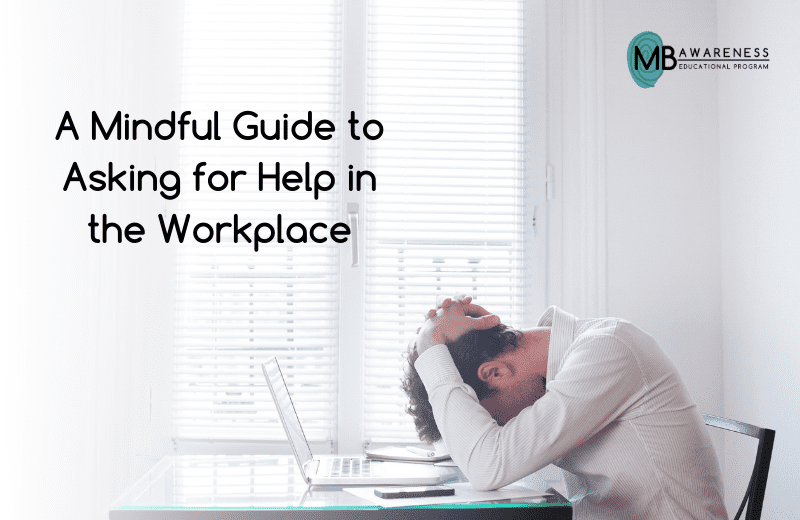Begin With Awareness
Asking for help at work can be tough. In some workplace cultures, the culture and dynamics are not conducive to seeking out mentorship and support. Perhaps asking for help has not felt safe and required vulnerability. You might even hold a belief that it’s not okay to ask for help. Many of us were taught that asking for help is a sign of weakness or incompetence. Whatever the situation, it is sometimes essential to reach out to others.
As human beings, we need each other. There is power in numbers, and we multiply our abilities when we tap into the strengths and knowledge bases of those around us. The respected business coach, Dan Sullivan of Strategic Coach, calls this the who, not how. Mindfulness improves the workplace experience in many ways, adding to the ability to pay attention to others and notice when they need or can offer help. Learning ways to ask for help could be the next step for you in tapping into your unstoppable inner strength to create the best possible work experience.
- Recognize that you need help.
When you are living a mindful life, you are cultivating an awareness of what is happening here and now. Meditation is one of the most effective ways to become self-aware and it allows us to form an awareness of what is happening around us. When we are noticing our breath and physical sensations in our bodies, we are asking, “what is happening.” This awareness expands when we are then able to begin to detach from thoughts and emotions. Especially when we are faced with a problem.
I was a master at rumination before I started the practice of mindfulness. I firmly believed that if I thought about something long enough and repeatedly, I would solve the problem or situation. I almost never had that magical breakthrough and more often than not, lost a good night’s sleep.
It is in these moments of stillness in practice that we are able to recognize that we may not have all of the answers, skills, abilities, or job positions to reach our goal or solve our problem. There is a great article in The Muse listing four times that it’s important to ask for help. Nowadays, I know that I need to reach out to someone else if the knot in my stomach arises from fear, stress, or anxiety. This is my physical signal that something is up and I need to seek out help from others. I am able to stop myself when I notice that I am thinking the same thoughts over and over.
- Be clear about the outcome you want to achieve.
Help can come in many forms. Help may look like emotional or mental support, or perhaps someone on your team needs to actually get in the trenches with you to get a project finished. Being clear about the end goal will help you to figure out what or who you need to help you.
The regular practice of mindfulness meditation can help you obtain clarity around the situation and what you need or want to accomplish. It can also help you determine to whom you are reaching out. Here at Mind Body Align, we ask ourselves who can help us get where we want to go before we ask how we are going to do it.
Sometimes something as simple as three deep breaths can help us to really identify what is causing us to feel overwhelmed and to clarify the objectives.
- Understand your ask
Have a clear ask when approaching someone for help. Be ready with clear concise answers to objections and provide solutions when you can. Knowing your capabilities and boundaries can lead to a mindful and fruitful relationship with your colleagues.
Most people want to help. Interdependence is really part of the human experience. You may recognize that you are giving the other person an opportunity to feel valued, effective, and competent when you ask others to participate. Also, remember to thank others for their willingness to collaborate or take something off of your plate.
- Be willing to help others
Most of us are familiar with The Golden Rule. Not only is it golden, it is timeless. Being willing to help others joyfully sets a tone for when we need help. If you are willing to help others it demonstrates that you are aware of the importance of relationships and collaboration in the office. It also makes the ask easier if you have been available when others needed help. If you are a manager or leader, you have a perfect opportunity to model behaviors that encourage a healthy work life.
- Be responsible for your own experience
When you cultivate self-awareness and emotional intelligence, you understand that you have responsibility for your experience in any situation. Sitting idly waiting for life to happen often does not produce the outcomes we prefer. Complaining that it is the boss’s fault or not speaking up when we need to often leads to letdowns, discouragement, and disappointments.
Being mindful is more than just striving for less stress. It is about creating confidence in yourself to objectively observe what is happening, learning to listen to yourself, and taking action when needed. Mindfulness practice allows us to get to know our biases, release judgments, and fosters curiosity. It allows us to find our voice and play an active role in our lives.
You can do it!
Expressing what you need at work might seem like an impossible task, but when we approach it with the wisdom that we develop through mindfulness and self awareness, we move more easily and effectively through the world. When we are able to calm ourselves down, and actually think about reason, past our inner critic who may be telling us to “suck it up” or “figure it out,” we are able to live as our authentic selves and form honest working relationships. All steps toward moving us one step closer to living the life we designed.










